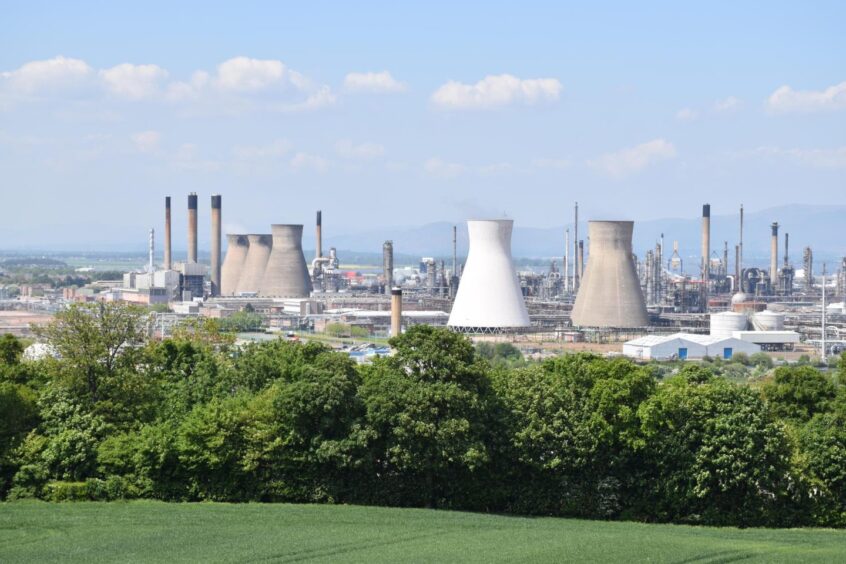 © Supplied by INEOS
© Supplied by INEOS The announcement from PetroIneos that Scotland’s only oil refinery at Grangemouth will close by 2025 can, one hopes, be reversed and time bought.
We have been here before with Ineos when similar declarations of intent were headed off.
For the sake of 400 jobs at stake and far wider implications for the Scottish economy, there needs to be a similar outcome this time.
Meanwhile, the threat itself has acted as an overdue wake-up call that talking about a “just transition” doesn’t cut it when people’s livelihoods are suddenly under threat.
An overview always has to be maintained of what transition entails and how its credibility is put at risk by looking at only one side of that equation.
Take the example of the Acorn project and the view voiced by Professor Alex Kemp that the closure of the Grangemouth refinery would threaten its viability. By any standard, his analysis merits serious attention so it seems strange how little response it generated, perhaps due to political embarrassment.
When one recalls all the political debate that has surrounded Acorn for years, surely someone in the Scottish Government should have been able to offer a definitive view on the relationship with Grangemouth?
Was the degree of dependency even considered through the years of political rhetoric? That would have created a necessary context for informed debate, about both Grangemouth and Acorn.
As with much else in the “just transition” scenario, our stumble towards change seems like a jigsaw being put together without knowing what picture is supposed to emerge.
That needs to be corrected as a matter of urgency. In order to inspire public confidence and support, there needs to be a clear vision and a route map for getting there.
We are in serious danger of drifting into a procession of decisions taken in response to changing circumstances in the energy world – and by that I mean the world as it is rather than as we might like it to be. Marrying environmental objectives with pragmatic realism should not be impossible to explain. Instead, they are often presented as competitors.
If the aim is to use less fossil fuels, then fair enough. Just don’t be surprised when that has consequences which are not to our immediate liking.
The spectacle of a Green MSP who happens to come from Grangemouth denouncing “betrayal” sums up the irrationality of exuding virtue and then complaining about the implications.
For people in Grangemouth at this juncture, the phrase “just transition” sounds pretty empty because nobody can tell them what it means, except in the haziest of terms.
Earlier this year, a Holyrood committee held a short inquiry into that precise question about “a Just Transition for the Grangemouth area”.
Their endeavours were not helped by PetroIneos declining an invitation to appear before them but that all-party committee ended up with a plea to the Scottish Government to “establish a clear and concise definition of what is meant by ‘just transition’ to inform future plans”. That plea now takes on new urgency.
One big transition has been taking place without anyone announcing it. A new report suggests that the number of jobs supported by the North Sea has dropped over a decade from 441.,000 to 214,000 – still a large number and one that needs to be protected rather than further eroded until real alternatives are available. But does anyone believe that is happening?
The hype around “just transition” needs to be backed by evidence, action and clarity.
In 2021, a Scottish Government paper declared: “No country has developed a National Just Transition Planning Framework – until now”. Nearly three years later, it is reasonable to expect tangible evidence of what that framework consists of and how it is progressing.
Otherwise, the “just transition” promise will increasingly be regarded as empty words.
It would be interesting to know how many of the 200,000 lost jobs related to the North Sea have transitioned to the brave new renewable energy future. Not a lot, I guess.
If that is going to change, there has to be firm evidence of where jobs and investment are coming from.
I do not underestimate the scale or complexity of the challenge if benefits are to be reaped and realistic targets met. However, it is exactly these characteristics which make it so important to have clarity about objectives and how they are to be attained.
There needs political leadership that is currently in short supply in Scotland and the wider UK.
At Holyrood, instead of half a dozen, largely unknown Ministers having a finger in the “just transition” pie, it might make sense to have one serious person who is charged with giving the public confidence in the overall agenda..
The presence of Green ministers does not help that cause because it is now widely assumed that they are running the “transition” and that their interests are skewered against achieving a balance between what exists and where we are trying to get to.
We also need the two governments to work together on what should be a shared mission.
Each has responsibilities which need to co-ordinated if, for example, the “re-wiring of Britain” is to be a major national enterprise, fundamental to “just transition”, rather than a piecemeal process which might or might not deliver.
